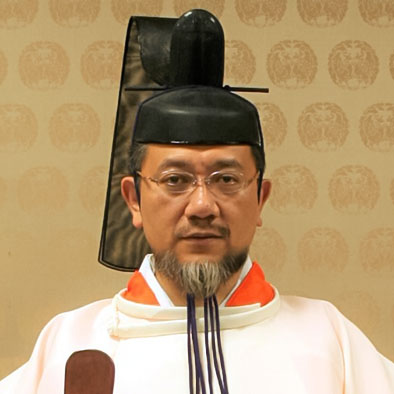Moderator and Panelist

Rt. Rev. Yoshinobu Miyake
三宅 善信 師
Session 3
"AI’s Threats and Human Responsibilities"
Panelist
Curriculum Vitae
Rt. Rev. Yoshinobu Miyake, born in 1958 into a well-known family of Shinto priests in Osaka, Japan.
He studied at Doshisha University in Kyoto and at Harvard Univ. and publishes frequently.
He took important rolls in his Shinto Church as Superior General.
For the past 40 years he has been active worldwide in the interfaith field.
In 1997 he established RELNET Corporation, whose website publishes widely on religion-related matters.
He serves as board member of Religions for Peace Japan, the Chair of the Board in International Shinto Studies Association, the Vice President of the UN Association Japan Kansai Capital, and so on.
Most Recently, he led G20 Interfaith Forum 2019 to success as the Chair of the Steering Committee.
Abstract
The year 2017 must be unquestionably the remarkable year when some in a couple of centuries would take a careful look at the history of humanity. Why…? Because AI (Artificial Intelligence) showed its superiority to any single Go master of China, Korea, and Japan in the over 2000 years lasting popular board game of East Asia. I have taken it for granted that AI is impossibly unable to knock the proficient master players out, who have devoted their whole life for the Go or Shogi board games of in-depth strategy and intelligence. As the game maker is far less-skilled than any master, the skill of the game maker is nothing different from that of an amateur even though a computer records its great achievement in its accounting speed.
How is it possible that AI defeated the Go masters? The answer is “deep learning.” By which, AI learns and practices in order to reach its excellence by addressing the enormous amount of data and experiencing games with itself. We surely teach AI nothing. A computer never gets exhausted, and thus it keeps learning for 24 hours every day. Reportedly, one program for merely 2 years has experienced more games than millions of players have enjoyed for 2 millenniums. Therefore, no genius can exercise as many games as the computer does. Accordingly, the year 2017 witnessed “singularity,” a distinguished shift change in the history of AI.
This great change reminds me of two scriptural stories. The one is the well-known “Paradise Lost” in Chapter 3 of the Book of Genesis. God creates Adam and Eve and warns them not to eat fruits of the tree of knowledge while they are allowed to have rest of the fruits in the Garden of Eden. The reason is eating the fruits of the tree leads them to death. Eventually, they ate the fruits, however, the fruits did not kill them. Then, as they tried to hide fearing the divine punishment, God banished them from the eternal Eden. In conclusion, we, the offspring of Adam and Eve, came to be responsible for our sins.
The other story I am highlighting is a paean found in the antique Indian Brahmanism scripture, the Rigveda. “The two friend eagles stay on the same tree. The one enjoys sweet fruits of the linden tree while the other just observes.” This means, the latter eagle did not fall as it did not challenge Deity by inquiring of Him good or evil. On the other hand, the former eagle fell because it devoured the fruit, which is a quest for the real essence, namely the divine will.
Here, I present an interesting point which should not be ignored. Both monotheist and polytheist traditions in the Middle East and India, in which dynamic civilizations emerged, imply knowledge is the termination of God-human relationship. Now, we are facing another distinct relationship between humanity and AI. In a sense, God is responsible for his inaccuracy that He gave human being their free will, and human being challenged God through their free will. How shall we handle the AI issue in our time? We are responsible for the unprecedented troubles AI would make since we gave AI the “tree of knowledge,” namely, “deep learning.”
